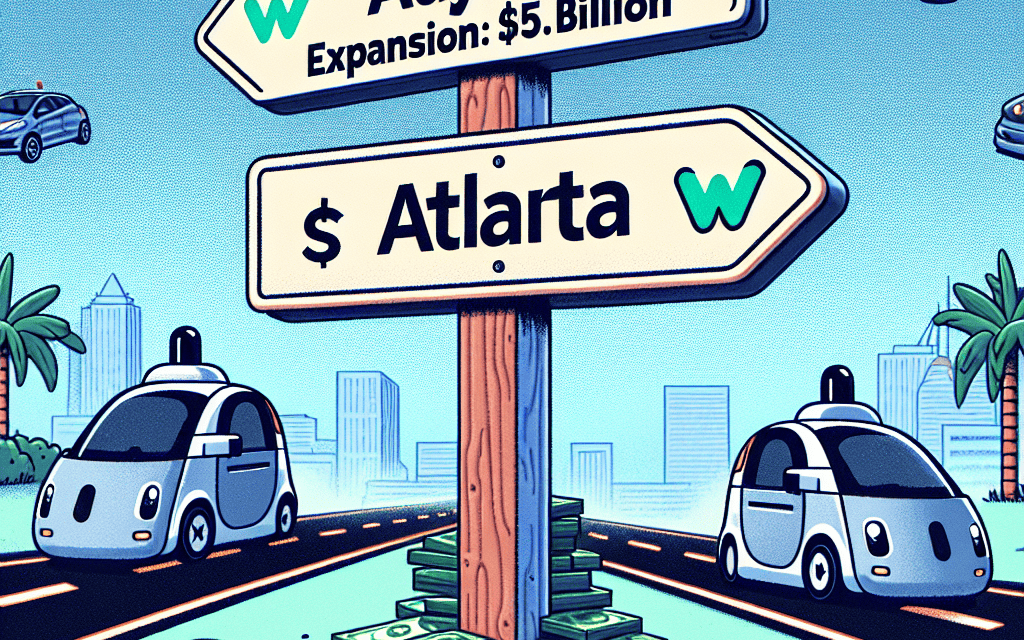“Waymo Drives Forward: $5.6 Billion Boost Fuels Expansion in Austin and Atlanta”
Introduction
Waymo, the autonomous vehicle technology company, has successfully secured $5.6 billion in funding to support its expansion efforts in Austin, Texas, and Atlanta, Georgia. This significant financial boost underscores Waymo’s commitment to advancing its self-driving technology and broadening its operational footprint in key urban markets. The investment will facilitate the deployment of Waymo’s autonomous ride-hailing services and bolster its technological infrastructure, aiming to enhance urban mobility and revolutionize transportation in these bustling cities. As Waymo continues to lead in the autonomous vehicle industry, this expansion marks a pivotal step in its mission to make self-driving technology accessible and reliable for everyday use.
Waymo’s Strategic Expansion: A $5.6 Billion Investment in Austin and Atlanta
Waymo, the autonomous vehicle subsidiary of Alphabet Inc., has recently announced a significant milestone in its strategic expansion efforts, securing $5.6 billion in funding to bolster its operations in Austin, Texas, and Atlanta, Georgia. This substantial investment marks a pivotal moment in Waymo’s journey towards revolutionizing urban transportation through the deployment of self-driving technology. As the company continues to advance its mission of making roads safer and transportation more accessible, this financial boost is set to accelerate its growth and innovation in these key metropolitan areas.
The decision to focus on Austin and Atlanta is not arbitrary. Both cities present unique opportunities and challenges that align with Waymo’s long-term vision. Austin, known for its vibrant tech scene and progressive attitude towards innovation, offers a conducive environment for testing and deploying cutting-edge technologies. The city’s rapidly growing population and increasing traffic congestion underscore the need for efficient and sustainable transportation solutions, making it an ideal testing ground for Waymo’s autonomous vehicles. Meanwhile, Atlanta, with its diverse demographics and sprawling urban landscape, provides a contrasting yet equally valuable setting for Waymo to refine its technology and expand its service offerings.
This infusion of capital will enable Waymo to enhance its existing infrastructure and scale its operations in these cities. A significant portion of the funding will be allocated towards expanding the company’s fleet of autonomous vehicles, which are equipped with state-of-the-art sensors and machine learning algorithms. By increasing the number of vehicles on the road, Waymo aims to gather more data and insights, which are crucial for improving the safety and reliability of its self-driving technology. Additionally, the investment will support the development of advanced mapping and navigation systems, ensuring that Waymo’s vehicles can navigate complex urban environments with precision and ease.
Moreover, the funding will facilitate the establishment of new partnerships and collaborations with local governments, businesses, and communities. Waymo recognizes the importance of building strong relationships with stakeholders to foster trust and acceptance of autonomous vehicles. By working closely with city officials and transportation authorities, Waymo aims to integrate its services seamlessly into existing transportation networks, complementing public transit options and reducing the reliance on private car ownership. Furthermore, partnerships with local businesses will enable Waymo to explore innovative use cases for its technology, such as autonomous delivery services and ride-hailing platforms.
As Waymo embarks on this ambitious expansion, it remains committed to prioritizing safety and transparency. The company has consistently emphasized the importance of rigorous testing and validation processes to ensure that its autonomous vehicles meet the highest safety standards. By engaging with local communities and soliciting feedback, Waymo aims to address any concerns and demonstrate the tangible benefits of its technology. This approach not only fosters public confidence but also paves the way for broader acceptance and adoption of autonomous vehicles in the future.
In conclusion, Waymo’s $5.6 billion investment in Austin and Atlanta represents a significant step forward in the company’s quest to transform urban transportation. By leveraging this funding to expand its operations, enhance its technology, and forge strategic partnerships, Waymo is poised to make a lasting impact on the way people move within cities. As the company continues to push the boundaries of innovation, it remains steadfast in its commitment to creating a safer, more efficient, and sustainable transportation ecosystem for all.
The Impact of Waymo’s Funding on Autonomous Vehicle Technology
Waymo, the autonomous vehicle subsidiary of Alphabet Inc., has recently secured a substantial $5.6 billion in funding, marking a significant milestone in the advancement of autonomous vehicle technology. This influx of capital is earmarked for expansion into new markets, specifically Austin, Texas, and Atlanta, Georgia. The strategic choice of these cities is not arbitrary; both Austin and Atlanta are burgeoning tech hubs with a growing interest in innovative transportation solutions. As Waymo sets its sights on these new territories, the implications for the autonomous vehicle industry are profound.
The infusion of $5.6 billion is expected to accelerate the development and deployment of Waymo’s self-driving technology. This funding will enable the company to enhance its existing fleet, improve its technology, and expand its operational capabilities. By focusing on Austin and Atlanta, Waymo is positioning itself to tap into diverse urban environments that present unique challenges and opportunities for autonomous vehicles. Austin, known for its tech-savvy population and progressive transportation policies, offers a conducive environment for testing and refining autonomous systems. Meanwhile, Atlanta’s complex traffic patterns and varied infrastructure provide a robust testing ground for the adaptability and resilience of Waymo’s technology.
Moreover, this expansion is likely to stimulate local economies by creating new jobs and fostering innovation. As Waymo establishes its presence in these cities, it will inevitably require a workforce skilled in technology, engineering, and operations. This demand could lead to partnerships with local educational institutions and training programs, thereby enhancing the skill set of the local labor market. Additionally, the presence of a leading autonomous vehicle company could attract other tech firms and startups, further solidifying Austin and Atlanta as key players in the tech industry.
The broader impact of Waymo’s funding extends beyond local economies and into the realm of public perception and regulatory frameworks. As autonomous vehicles become more prevalent, public acceptance is crucial for their widespread adoption. Waymo’s expansion into new markets provides an opportunity to engage with communities, educate the public about the benefits and safety of autonomous vehicles, and address any concerns. This engagement is essential for building trust and fostering a positive perception of self-driving technology.
Furthermore, Waymo’s move into Austin and Atlanta could influence regulatory policies at both the state and federal levels. As these cities become testing grounds for autonomous vehicles, they may serve as models for other regions considering similar initiatives. The data and insights gained from operating in these diverse environments could inform future regulations, ensuring they are conducive to innovation while prioritizing public safety.
In conclusion, Waymo’s $5.6 billion funding for expansion into Austin and Atlanta represents a pivotal moment for the autonomous vehicle industry. This strategic move not only accelerates the development of self-driving technology but also has far-reaching implications for local economies, public perception, and regulatory frameworks. As Waymo navigates the challenges and opportunities presented by these new markets, it is poised to play a leading role in shaping the future of transportation. The success of this expansion could set a precedent for other companies in the industry, ultimately driving the evolution of autonomous vehicles and their integration into everyday life.
How Waymo’s Expansion Could Transform Urban Mobility in Austin and Atlanta
Waymo, the autonomous vehicle subsidiary of Alphabet Inc., has recently secured a substantial $5.6 billion investment aimed at expanding its operations in Austin, Texas, and Atlanta, Georgia. This significant financial backing underscores the growing confidence in autonomous vehicle technology and its potential to revolutionize urban mobility. As cities grapple with increasing traffic congestion and environmental concerns, Waymo’s expansion into these urban areas could herald a transformative shift in how residents navigate their daily commutes.
The choice of Austin and Atlanta as focal points for Waymo’s expansion is strategic. Both cities are experiencing rapid population growth, which has led to increased demand for efficient and sustainable transportation solutions. Austin, known for its vibrant tech scene and progressive urban planning initiatives, provides an ideal testing ground for Waymo’s cutting-edge technology. Meanwhile, Atlanta, with its sprawling metropolitan area and diverse demographic, offers a unique set of challenges and opportunities for autonomous vehicle deployment. By establishing a presence in these cities, Waymo aims to demonstrate the viability and benefits of self-driving technology in diverse urban environments.
One of the primary advantages of autonomous vehicles is their potential to reduce traffic congestion. In cities like Austin and Atlanta, where traffic jams are a daily occurrence, the introduction of self-driving cars could lead to more efficient use of roadways. Autonomous vehicles are designed to optimize routes and maintain consistent speeds, which can help alleviate bottlenecks and improve overall traffic flow. Furthermore, by reducing the need for human drivers, these vehicles can operate around the clock, providing a continuous transportation service that adapts to real-time traffic conditions.
In addition to easing congestion, Waymo’s expansion could also contribute to environmental sustainability. Autonomous vehicles are often electric, which aligns with efforts to reduce carbon emissions and combat climate change. By replacing traditional gasoline-powered cars with electric self-driving vehicles, cities can significantly decrease their carbon footprint. This shift not only supports environmental goals but also enhances air quality, leading to healthier urban living conditions.
Moreover, the deployment of autonomous vehicles has the potential to improve accessibility and inclusivity in urban transportation. For individuals who are unable to drive due to age, disability, or other factors, self-driving cars offer a newfound independence and mobility. Waymo’s technology can provide reliable and affordable transportation options for underserved communities, bridging gaps in existing public transit systems and ensuring that all residents have access to essential services and opportunities.
However, the integration of autonomous vehicles into urban settings is not without challenges. Concerns about safety, regulatory compliance, and public acceptance must be addressed to ensure a smooth transition. Waymo has been proactive in engaging with local governments and communities to build trust and demonstrate the safety of its technology. Rigorous testing and transparent communication are essential components of this effort, as they help to alleviate public apprehensions and foster a positive perception of autonomous vehicles.
In conclusion, Waymo’s $5.6 billion expansion into Austin and Atlanta represents a significant step forward in the evolution of urban mobility. By leveraging advanced technology to address pressing transportation challenges, Waymo has the potential to transform how residents of these cities move and interact with their environment. As autonomous vehicles become an integral part of urban landscapes, they promise to deliver a future of safer, more efficient, and more sustainable transportation for all.
Analyzing the Economic Implications of Waymo’s $5.6 Billion Investment

Waymo’s recent announcement of securing $5.6 billion for its expansion into Austin and Atlanta marks a significant milestone in the autonomous vehicle industry. This substantial investment not only underscores the growing confidence in self-driving technology but also highlights the potential economic implications for the regions involved. As Waymo sets its sights on these burgeoning markets, it is essential to consider the broader economic landscape and the potential ripple effects of such a large-scale investment.
To begin with, the infusion of $5.6 billion into Austin and Atlanta is likely to stimulate local economies by creating new job opportunities. As Waymo establishes its operations, there will be a demand for a diverse range of roles, from software engineers and data analysts to vehicle operators and maintenance staff. This influx of employment opportunities can lead to a reduction in local unemployment rates and contribute to the overall economic vitality of these cities. Moreover, the presence of a leading technology company like Waymo can attract other businesses and investors, further enhancing the economic prospects of the regions.
In addition to job creation, Waymo’s expansion is poised to foster innovation and technological advancement. By establishing a foothold in Austin and Atlanta, Waymo can collaborate with local universities, research institutions, and tech startups. Such partnerships can lead to the development of cutting-edge technologies and solutions that can be applied beyond the realm of autonomous vehicles. This collaborative environment can position both cities as hubs of innovation, attracting talent and investment from across the globe.
Furthermore, the introduction of autonomous vehicles in Austin and Atlanta can have significant implications for urban infrastructure and transportation systems. As Waymo’s self-driving cars become more prevalent, there may be a need to adapt existing roadways and traffic management systems to accommodate this new mode of transportation. This could lead to increased investment in infrastructure projects, providing a boost to the construction industry and related sectors. Additionally, the widespread adoption of autonomous vehicles has the potential to reduce traffic congestion and improve air quality, contributing to a more sustainable urban environment.
However, it is important to acknowledge the potential challenges and concerns associated with Waymo’s expansion. The introduction of autonomous vehicles may disrupt traditional transportation industries, such as taxi and rideshare services, leading to job displacement for some workers. Policymakers and stakeholders must work collaboratively to address these challenges and ensure a smooth transition for affected individuals. This may involve retraining programs and initiatives to help workers adapt to the changing job landscape.
Moreover, the deployment of autonomous vehicles raises questions about data privacy and security. As Waymo collects and processes vast amounts of data to operate its self-driving cars, it is crucial to establish robust data protection measures to safeguard user information. Ensuring transparency and building public trust will be essential for the successful integration of autonomous vehicles into everyday life.
In conclusion, Waymo’s $5.6 billion investment in Austin and Atlanta represents a significant step forward for the autonomous vehicle industry and holds the potential to drive economic growth and innovation in these regions. While there are challenges to address, the overall impact of this expansion is likely to be positive, paving the way for a future where autonomous vehicles play an integral role in urban transportation systems. As Waymo continues to push the boundaries of technology, the economic implications of its investment will undoubtedly be felt for years to come.
The Role of Waymo’s Expansion in the Future of Smart Cities
Waymo, a leader in autonomous vehicle technology, has recently secured $5.6 billion in funding to expand its operations in Austin and Atlanta. This significant investment marks a pivotal moment in the evolution of smart cities, as it underscores the growing importance of integrating advanced transportation solutions into urban planning. As cities worldwide grapple with increasing congestion, pollution, and the need for sustainable infrastructure, Waymo’s expansion offers a glimpse into the future of urban mobility and its potential to transform cityscapes.
The infusion of capital into Waymo’s operations is not merely a financial milestone; it represents a strategic move to position autonomous vehicles as a cornerstone of smart city development. By choosing Austin and Atlanta as focal points for expansion, Waymo is tapping into two dynamic urban environments that are ripe for innovation. Both cities have demonstrated a commitment to embracing technology-driven solutions, making them ideal testbeds for the integration of autonomous vehicles into everyday life. This expansion is expected to enhance the efficiency of transportation networks, reduce traffic congestion, and contribute to a reduction in carbon emissions, aligning with broader sustainability goals.
Moreover, the deployment of Waymo’s autonomous vehicles in these cities will likely catalyze further advancements in smart city infrastructure. As these vehicles become more prevalent, there will be an increased demand for supporting technologies such as smart traffic signals, enhanced connectivity, and data-driven urban planning tools. This symbiotic relationship between autonomous vehicles and smart city infrastructure will not only improve transportation efficiency but also enhance the overall quality of urban life. For instance, the data collected by Waymo’s vehicles can be leveraged to optimize traffic flow, reduce travel times, and improve road safety, thereby creating a more seamless and enjoyable urban experience for residents.
In addition to the technological benefits, Waymo’s expansion is poised to have significant economic implications. The introduction of autonomous vehicles into Austin and Atlanta’s transportation ecosystems is expected to create new job opportunities, particularly in sectors related to technology development, vehicle maintenance, and data analysis. Furthermore, as these cities become hubs for autonomous vehicle innovation, they are likely to attract additional investment from technology companies and startups seeking to capitalize on the burgeoning smart city market. This influx of investment could spur economic growth and position Austin and Atlanta as leaders in the global race toward smart city development.
However, the integration of autonomous vehicles into urban environments is not without its challenges. Concerns regarding data privacy, cybersecurity, and regulatory compliance must be addressed to ensure the successful deployment of these technologies. Waymo’s expansion will necessitate collaboration with local governments, policymakers, and community stakeholders to navigate these complex issues and establish a framework that prioritizes public safety and trust. By fostering an open dialogue and engaging with diverse perspectives, Waymo can help pave the way for a future where autonomous vehicles are seamlessly integrated into the fabric of smart cities.
In conclusion, Waymo’s $5.6 billion expansion into Austin and Atlanta represents a significant step forward in the evolution of smart cities. By leveraging cutting-edge technology and fostering collaboration with key stakeholders, Waymo is poised to transform urban mobility and contribute to the development of more sustainable, efficient, and livable cities. As autonomous vehicles become an integral part of the urban landscape, they hold the potential to redefine the way we navigate and interact with our cities, ultimately shaping the future of urban living.
Challenges and Opportunities in Waymo’s Growth Strategy
Waymo, the autonomous vehicle subsidiary of Alphabet Inc., has recently secured a substantial $5.6 billion investment aimed at expanding its operations in Austin, Texas, and Atlanta, Georgia. This significant financial boost underscores the company’s commitment to advancing its self-driving technology and scaling its services in new urban environments. However, as Waymo embarks on this ambitious growth strategy, it faces a myriad of challenges and opportunities that will shape its trajectory in the burgeoning autonomous vehicle industry.
One of the primary challenges Waymo encounters is the complex regulatory landscape governing autonomous vehicles. Each state in the United States has its own set of regulations and requirements for testing and deploying self-driving cars. In Texas and Georgia, Waymo must navigate these regulatory frameworks to ensure compliance and secure the necessary permits to operate. This process can be time-consuming and costly, potentially delaying the company’s expansion plans. Nevertheless, Waymo’s established reputation and experience in working with regulators may facilitate smoother negotiations and approvals, providing a competitive edge over newer entrants in the market.
In addition to regulatory hurdles, Waymo must also address the technological challenges inherent in deploying autonomous vehicles in diverse urban settings. Austin and Atlanta present unique driving environments, characterized by varying traffic patterns, road conditions, and weather scenarios. Waymo’s self-driving technology must be robust and adaptable enough to handle these complexities safely and efficiently. The company has invested heavily in research and development to enhance its machine learning algorithms and sensor technologies, aiming to improve the reliability and safety of its autonomous vehicles. This ongoing innovation is crucial for gaining public trust and acceptance, which are essential for the widespread adoption of self-driving cars.
Moreover, Waymo’s expansion into Austin and Atlanta offers significant opportunities for growth and market penetration. Both cities are experiencing rapid population growth and urbanization, leading to increased demand for efficient and sustainable transportation solutions. By introducing its autonomous ride-hailing services in these areas, Waymo can tap into a burgeoning market and establish itself as a leader in the mobility sector. Furthermore, the expansion aligns with broader trends towards smart city initiatives, where technology-driven solutions are leveraged to enhance urban living. Waymo’s presence in these cities could contribute to reducing traffic congestion, lowering emissions, and improving overall transportation efficiency.
Another opportunity lies in the potential for strategic partnerships and collaborations. As Waymo expands its operations, it can explore partnerships with local governments, businesses, and transportation agencies to integrate its services into existing infrastructure and transit systems. Such collaborations could facilitate seamless mobility solutions and enhance the overall user experience. Additionally, partnerships with technology companies and automotive manufacturers could accelerate the development and deployment of autonomous vehicle technology, driving further innovation and market growth.
In conclusion, Waymo’s $5.6 billion investment for expansion in Austin and Atlanta represents a pivotal moment in the company’s growth strategy. While regulatory and technological challenges pose significant hurdles, the opportunities for market penetration, innovation, and strategic partnerships are substantial. As Waymo navigates this complex landscape, its ability to adapt and innovate will be crucial in shaping the future of autonomous transportation and solidifying its position as a leader in the industry. The success of this expansion could serve as a blueprint for future endeavors, paving the way for a new era of mobility solutions.
Waymo’s Expansion: A Step Towards Mainstream Autonomous Transportation
Waymo, the autonomous vehicle subsidiary of Alphabet Inc., has recently secured a substantial $5.6 billion in funding to expand its operations into Austin, Texas, and Atlanta, Georgia. This significant financial boost marks a pivotal moment in the company’s journey towards mainstream autonomous transportation. As the world increasingly leans towards innovative mobility solutions, Waymo’s expansion into these burgeoning urban markets underscores its commitment to revolutionizing the way people commute.
The decision to target Austin and Atlanta is strategic, given both cities’ reputations as tech hubs with rapidly growing populations. Austin, known for its vibrant tech scene and progressive attitude towards innovation, provides an ideal environment for testing and deploying autonomous vehicles. Similarly, Atlanta’s status as a major metropolitan area with a diverse demographic offers a unique opportunity for Waymo to demonstrate the versatility and reliability of its technology. By entering these markets, Waymo aims to not only showcase its cutting-edge technology but also to gather valuable data that will further refine its autonomous systems.
Moreover, the infusion of $5.6 billion will enable Waymo to enhance its technological infrastructure and expand its fleet of autonomous vehicles. This financial backing is expected to accelerate the development of Waymo’s proprietary software and hardware, ensuring that its vehicles can navigate complex urban environments with increased precision and safety. Additionally, the funding will support the establishment of local operational teams in Austin and Atlanta, fostering partnerships with city officials and stakeholders to ensure a seamless integration of autonomous vehicles into existing transportation networks.
Transitioning to the broader implications of this expansion, Waymo’s move into Austin and Atlanta represents a significant step towards the mainstream adoption of autonomous transportation. As public awareness and acceptance of self-driving technology grow, Waymo’s presence in these cities will likely serve as a catalyst for broader societal shifts in how people perceive and utilize transportation. The company’s commitment to safety and transparency will be crucial in building public trust, as it continues to engage with communities to address concerns and highlight the benefits of autonomous vehicles.
Furthermore, Waymo’s expansion is poised to have a ripple effect on the local economies of Austin and Atlanta. The introduction of autonomous vehicles is expected to create new job opportunities, particularly in areas such as vehicle maintenance, data analysis, and customer support. Additionally, the presence of a leading autonomous vehicle company could attract other tech firms and startups to these cities, fostering an ecosystem of innovation and collaboration.
In conclusion, Waymo’s $5.6 billion funding for expansion into Austin and Atlanta marks a significant milestone in the journey towards mainstream autonomous transportation. By strategically targeting these dynamic urban markets, Waymo is not only advancing its technological capabilities but also paving the way for broader societal acceptance of self-driving vehicles. As the company continues to innovate and expand, it is poised to play a pivotal role in shaping the future of transportation, offering a glimpse into a world where autonomous vehicles are an integral part of everyday life. Through its commitment to safety, collaboration, and technological excellence, Waymo is setting the stage for a new era of mobility that promises to transform how people move and interact with their cities.
Q&A
1. **What is Waymo?**
Waymo is an autonomous driving technology company and a subsidiary of Alphabet Inc., focused on developing self-driving vehicles.
2. **How much funding did Waymo secure for its expansion?**
Waymo secured $5.6 billion for its expansion efforts.
3. **Which cities are targeted for Waymo’s expansion?**
Waymo is targeting Austin, Texas, and Atlanta, Georgia, for its expansion.
4. **What is the purpose of the funding?**
The funding is intended to support the expansion of Waymo’s autonomous vehicle operations and infrastructure in new markets.
5. **Who are the investors in this funding round?**
The investors include both existing and new stakeholders, though specific names are not provided in the question.
6. **What is the significance of Austin and Atlanta for Waymo?**
Austin and Atlanta are significant due to their growing urban environments and potential for integrating autonomous vehicle technology.
7. **What impact is Waymo’s expansion expected to have?**
The expansion is expected to enhance Waymo’s market presence, improve transportation options, and contribute to the development of autonomous vehicle technology.
Conclusion
Waymo’s successful acquisition of $5.6 billion in funding marks a significant milestone in its strategic expansion into Austin and Atlanta. This financial boost underscores investor confidence in Waymo’s autonomous vehicle technology and its potential to revolutionize urban transportation. By targeting these key cities, Waymo aims to enhance its operational footprint and accelerate the deployment of its self-driving services, potentially setting new standards in safety, efficiency, and accessibility in the autonomous vehicle industry. This expansion not only positions Waymo as a leader in the market but also signals a broader shift towards the integration of autonomous vehicles in everyday urban mobility.





